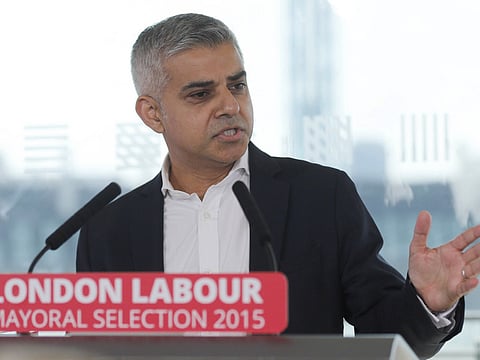Sadiq Khan: Muslim leftwinger can become London’s next mayor
Some Labourites think Sadiq Khan’s selection over Tessa Jowell is a disaster. But he’s sure he can beat Tory candidate Zac Goldsmith

The selection of Sadiq Khan, the Tooting MP, as Labour’s candidate to succeed Boris Johnson as London mayor has almost certainly set up an enticing contest to win the keys to City Hall next May. Khan is the council house-raised son of an migrant from Pakistan who drove London buses for a living. The hot favourite to be named his Tory opponent is Zac Goldsmith, the Richmond Park MP, whose swashbuckling financier dad counted Margaret Thatcher as a personal friend. Goldsmith’s old school is Eton. Khan’s is his local comp. Tales of two cities don’t come much starker.
But though the class struggle symbolism will be vivid — Khan will see to that — the substance of the race will be the two men’s competing visions of the British capital’s future and how best to shape it. The powers and resources of London mayors aren’t as great as they should be. They are, though, far greater than some believe, including holding Britain’s largest police service to account, creating and enforcing a framework for what gets built on London land and what gets knocked down, and exercising close control of the transport networks of an urban economy on which the rest of the country depends. Mayors have a big public platform and many channels of informal influence. It’s a big and serious job.
I’m pleased Khan has won, because I thought him the strongest of the six Labour hopefuls on policy emphasis, know how and attitude. Others will be pleased for different reasons. Some Conservatives will be rubbing their hands, while some Labourites will be downcast. Opinion polls and received wisdom have suggested that Tessa Jowell, who finished second, would have been more likely than Khan to beat Goldsmith. Khan isn’t as well known as Jowell. He doesn’t have the happy association she justifiably enjoys with the glories of the 2012 Olympics. He is less to the taste of the London Evening Standard’s top brass.
Also, Khan’s a Muslim. A recent YouGov survey found that although 55 per cent of Londoners would be comfortable with a Muslim mayor, a rather daunting 31 per cent would not. Then there’s his connection with the defeated Ed Miliband, whose successful Labour leadership campaign he ran in 2010. He’s on the left of Labour too — not the Jeremy Corbyn left, but tight enough with the unions to have attracted some exploratory “red scare” coverage.
Jowell, often called an “ultra-Blairite”, has long been seen as best equipped to attract Conservative-inclined voters. It is maintained, and with some reason, that such crossover appeal is crucial to victory — after all, Ken Livingstone had it, as did Boris Johnson in reverse. So, has London’s Labour “selectorate” ruined the party’s chances of winning its first big election in Britain since 2005? Don’t count on it.
Both “Ken” and “Boris” transcended party loyalties with a celebrity common touch neither Jowell nor Goldsmith possesses. In its absence, party loyalties may be more solid than in past mayoral contests and candidates judged a little more on policy, a little less on personality. Under the supplementary vote system, which allows voters to pick a first- and a second-choice candidate, even a fairly modest first-preference lead can be as good as home and dry — even if the leading runner’s closest rival does better with second preferences, as Livingstone did when defeated by Johnson in 2012.
Perhaps Jowell would have attracted more floating voters than Khan will. But could she have mobilised the Labour vote in London as effectively? It doesn’t matter where votes come from as long as they’re secured. In contrast to the rest of Britain, Labour did well in London in the general election, gaining seats and taking a 44 per cent vote share, compared with the Tories’ 35 per cent. That success wasn’t the work of just one man. However, Khan did run Labour’s London campaign.
As for the Muslim factor, a Survation poll — conducted soon after the YouGov finding about theoretical Muslim mayors appeared — told a different story. It found that London voters, including white ones, warmed to Khan when shown TV footage of both him and Goldsmith, and put him well ahead of the Conservative. Indeed, Khan attractively confounds hostile Muslim stereotypes: he backed gay marriage and, although he doesn’t drink, he launched his local general election campaign from a Tooting pub he’s fought to save from developers.
Like all the polls mentioned here, Survation’s should be approached with caution — we’re a long way from election day. But it hints that assumptions about Khan’s selection being a gift to his Tory opponent should be regarded warily. He is a politician of the practical left with a talented team around him. He is buzzing with drive and energy. Some Tories may be cheerful about his victory today, but Khan is very confident. Labour should be confident too.
— Guardian News & Media Ltd
Dave Hill is a novelist, blogger and occasional broadcaster.
Sign up for the Daily Briefing
Get the latest news and updates straight to your inbox


